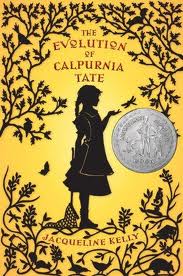The Evolution of Calpurnia Tate by Jacqueline Kelly
Reviewed by Ellen

2010 Newbery Honor Award
Ratings Explanation
Language: Profanity in many of Grandfather’s exuberant exclamations; Viola, the cook, tends to use “Jesus” and “Lord a’mighty” as exclamations. A handful of “damns” and “hells” sprinkled here and there.
Violence: Grandfather tells Callie about the horrors he witnessed during the Civil War: amputations, mutilations, death, disease, burning bodies.
Sexual Content: Calpurnia tells her best friend Lula what is expected of wives when they marry (“lots of kissing”); Callie learns how plants reproduce; some light discussion on the mating rituals of farm animals and other species in the wild.
Adult Themes: Callie’s mother drinks Lydia Pinkham’s “tonic water” (which isn’t water) when stressed. Grandfather smokes cigars and imbibes on occasion. He makes several attempts to produce liquor from pecans in his laboratory and gives Callie a taste, which results in her fitful coughing and belching.
Synopsis
It is 1899 in Fentress, Texas, and young Calpurnia Virginia Tate (known as “Callie Vee”), the only daughter of seven children in an uppercrust family, is soon to turn twelve. There are certain expectations of a girl in this era, none of which Callie is living up to. She is less than praiseworthy at knitting, sewing, cooking, or “deportment” (i.e.: posture and propriety). What she cherishes is spending time with her Grandfather, inaugural member of the National Geographic Society, out in his shed or in his library studying and classifying plants and insects and learning about evolution (gasp!). She is fascinated by science but realizes that because of societal constraints, she will probably never be able to realize her dream of becoming a scientist. Callie’s mother is overly concerned with her only daughter’s preoccupation with Darwin and Dickens, but when she attempts to steer her toward more ladylike pursuits by giving her the book The Science of Housewifery for a Christmas present (a humorous and poignant moment in the story), Callie feels her “life sentence [has] been delivered.” Despite these impediments, Callie is a determined and charming heroine who knows her heart and ambitions. The conversations she has and discovery she makes with her grandfather (a new plant species) are the highlights of the book. When a new invention, the telephone, comes to tiny Fentress and the entire town turns up to watch its installation, Grandfather says to her, “Do you realize what this means, Calpurnia? The old century is dying, even as we watch. Remember this day.” The book ends with the new century dawning, and the reader is left to wonder if Grandfather’s words will ring true not just for the passage of time, but for the future of our young lady scientist and her traditional expectations, as well.
A wonderful novel. I relished watching the relationship between inquisitive little Callie and her grandfather blossom as she learned by his side about the world around her. Lines like “I’d never fainted in my life, but I thought it sounded like an interesting experience,” and “It was too bad, but sometimes a little knowledge could ruin your whole day, or at least take off some of the shine” (upon seeing through a microscope all the miniscule creatures that inhabit her favorite swimming hole) made this book truly enjoyable and real. Details that make the turn-of-the-century come alive are Callie’s first taste of Coca-Cola at the county fair and Grandfather’s infatuation with a new-fangled invention, the automobile. A book you will recommend to your friends.
©2010 The Literate Mother









